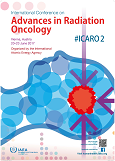Speaker
Miriam Joy Calaguas
(Jose R. Reyes Memorial Medical Center - Department of Radiotherapy)
Description
Introduction
During the first council meeting of FARO last May 2015, an Education and Training committee (ETC) has been proposed to primarily promote good quality education and training in the practice of Radiation Oncology in Asia. Currently, there are about 23,822 working radiation oncologists in the 11 participating countries. Of which, 16,944 are certified by their respective local certifying boards. A minimum of 3 and a maximum of 200-400 (China and India) radiation oncologists are certified per year for each country. The certification is based on the local standards set by different local specialty boards at par with other international and inter-Asian educational and training organizations including IAEA, ASTRO, ESTRO and SEAROG. Based on the latest statistics, about 1,637,627 cancer patients are treated with radiation per year resulting to a ratio of 1 certified radiation oncologist treating 97 patients per year.
The education and training of radiation oncology allied professionals which include medical physicists (MP) radiation therapy technologists (RTT) and nurses is also a concern for the creation of FARO ETC. Presently a certification system for MPs is being applied in the 11 participating countries except in Singapore. Currently, there are 5,125 certified medical physicists (4999 actively working) in the region. There are about 1 active certified medical physicist to work in 1-2 radiation facility (total of 7,984 RT facilities in the FARO countries). For RTTs, out of the 11 countries, all have certification system except for Indonesia, Korea and the Philippines. There are about 12,199 RTTs in the region, of which only 3,156 are certified RTTs. There is 1 certified RTT for approximately 2-3 radiation facilities.
Methodology
All eleven participating countries have radiation oncology training programs either as a fellowship program, a straight residency program (majority), an M.D. radiotherapy course or a diploma course. The individual curriculum varies based on the local preference and standards created by the different medical training councils, in which, most has a primary backbone of a two-part system: 1. Basic Science and; 2. Clinical Aspects of Radiation Oncology. The duration of training ranges from 3-7 years with an average of 4 years to most of the member countries.
The challenge of producing a sufficient number of radiation oncologists and allied professionals in the region is of the same importance as the programme of high quality educational courses that will meet FARO’s educational needs. The creation of the FARO ETC is very timely in order to develop the standard of education and training in Radiation Oncology and its related fields in Asia. There is a proposed Regional Cooperation Agreement (RCA) involving Government Parties under the International Atomic Energy Agency (IAEA). The primary objective is to provide education and training on clinical aspects of radiotherapy for radiation oncology professionals and improve clinical management of common cancers in the RCA region. The secondary objective is to strengthen or establish the national radiation oncology societies within the RCA Government Parties through the education and training activities of this project and further strengthen their regional collaboration through framework such as FARO.
The future direction is to create a standardized curriculum and framework in the FARO region that will serve as a guidance for the continuous development of the education and training programme, in order to address the ever-changing challenges faced by the profession
Conclusion
Taking into consideration the different socio-economic backgrounds, cultures, skills, capabilities and knowledge, creating just one educational and training plan is a big challenge. A strategic planning that will lead to the formulation of a work plan is necessary to outline the specific activities of the FARO ETC which includes training courses, exchange visitors program, teleconferences, E-learning program and other activities which the ETC committee will find relevant. A strong collaboration with other international and inter-Asian educational and training bodies and societies including IAEA, ASTRO, ESTRO, SEAROG is needed for the creation a standard training and education plan for both radiation oncologists and allied fields.
| Institution | Jose R. Reyes Memorial Medical Center-Department of Radiotherapy |
|---|---|
| Country | Philippines |
Author
Miriam Joy Calaguas
(Jose R. Reyes Memorial Medical Center - Department of Radiotherapy)
Co-authors
Angela Gaerlan-Tagle
(Jose R. Reyes Memorial Medical Center - Department of Radiotherapy)
Jerickson Abbie Flores
(Jose R. Reyes Memorial Medical Center)
June Canedo
(Jose R. Reyes Memorial Medical Center-Department of Radiotherapy)
Lilian Rodriguez
(Jose R. Reyes Memorial Medical Center-Department of Radiotherapy)

